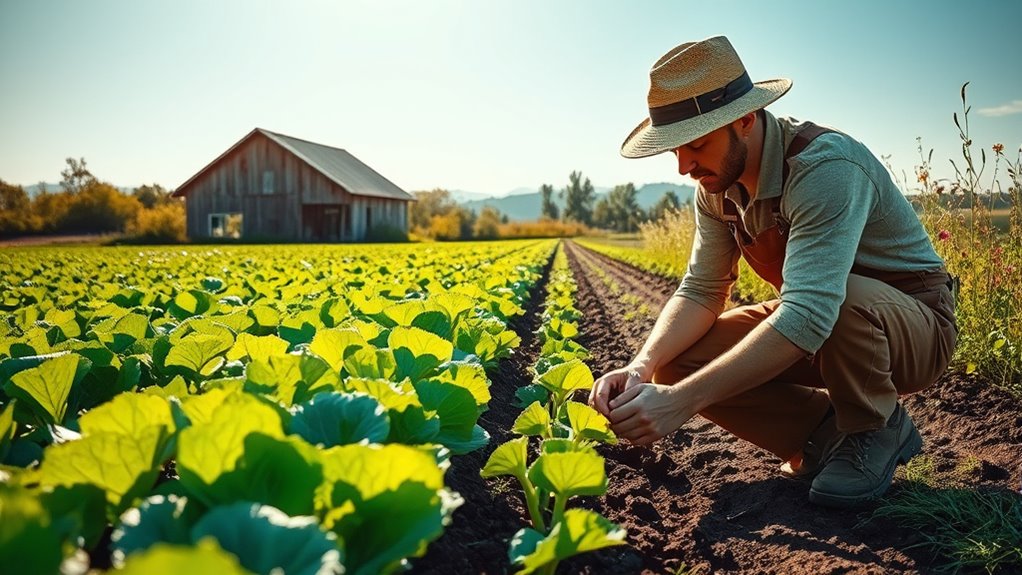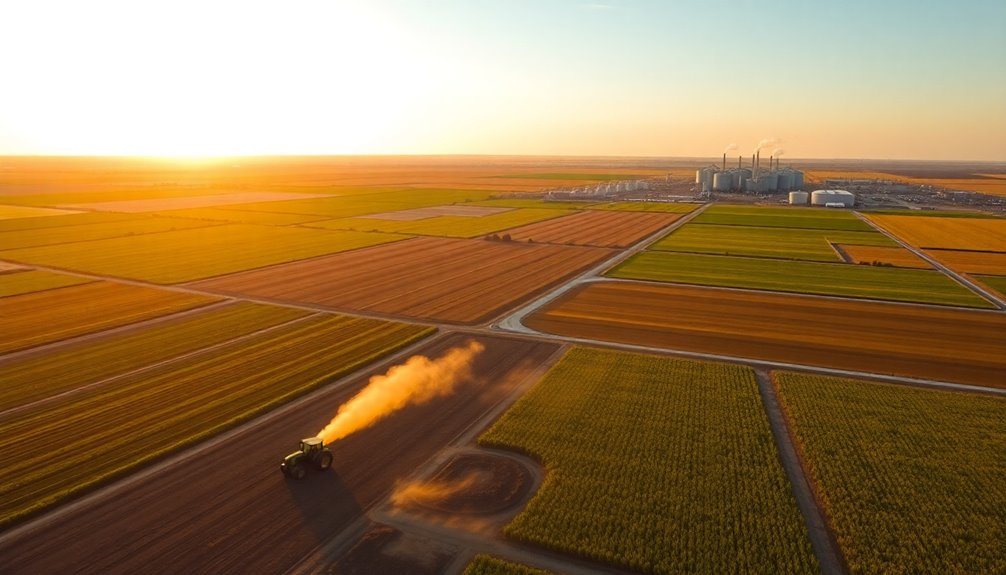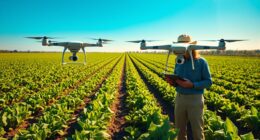Organic farming means going back to basics by focusing on a holistic approach that nurtures ecosystems. It promotes sustainability, fairness, and care for future generations. You'll find practices like crop rotation, composting, and cover crops, which enhance soil health and biodiversity. Plus, organic farming helps reduce chemical use and greenhouse gas emissions, benefiting the environment. There's so much more to explore about its principles and benefits, so keep going to learn how it impacts our world.
Key Takeaways
- Organic farming is an agricultural approach that prioritizes ecosystem health, focusing on soil, plants, animals, and humans.
- It emphasizes sustainability and biodiversity through practices like crop rotation, composting, and cover crops.
- Organic farming avoids synthetic fertilizers and pesticides, promoting natural methods for pest control and soil fertility.
- The movement supports fair relationships among farmers, workers, and consumers, ensuring ethical practices.
- Organic certification involves strict regulatory standards, including a transition period for converting conventional farms to organic.
Understanding Organic Farming Principles
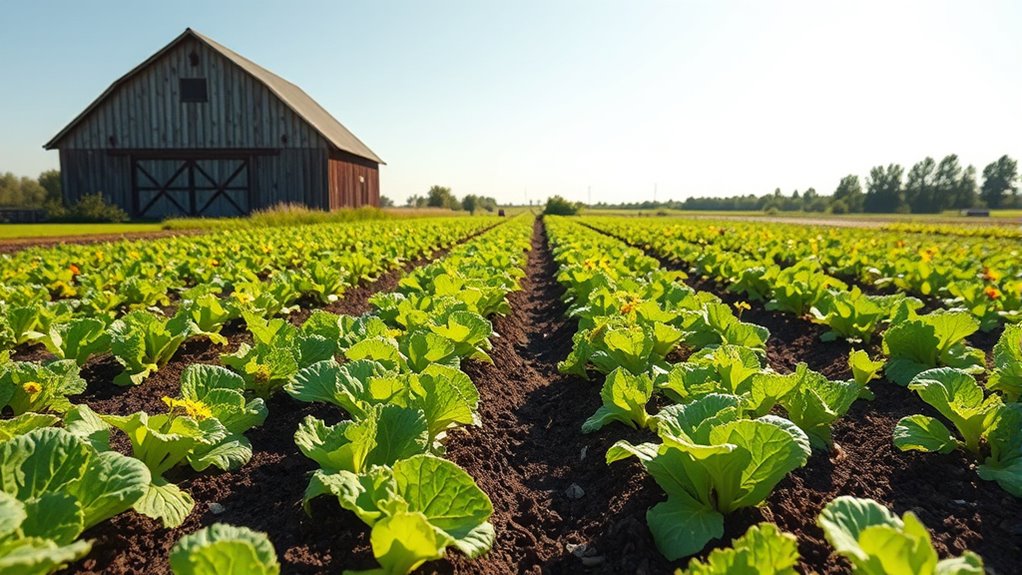
When you dive into organic farming principles, you'll discover a holistic approach that prioritizes the health of the entire ecosystem. This means focusing on the health of soil, plants, animals, humans, and the planet.
You'll also see that the principle of ecology emphasizes living systems and cycles, promoting sustainability and biodiversity.
Fairness ensures equitable relationships among farmers, workers, and consumers, creating a balanced community.
The principle of care commits to responsible management for the well-being of future generations and the environment.
These principles shape organic standards worldwide, guiding practices that respect both nature and people.
Key Ecological Practices in Organic Agriculture
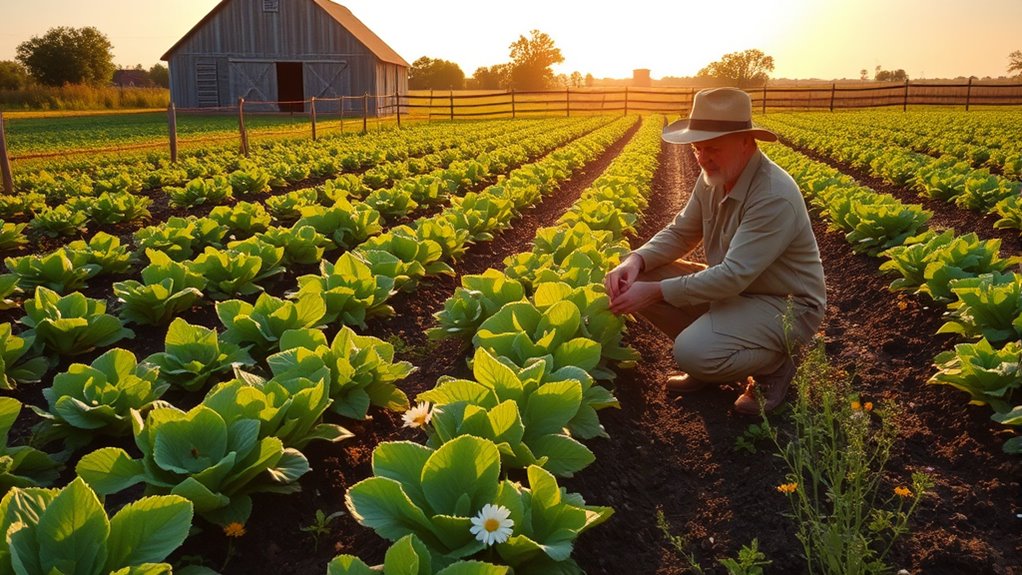
Organic farming principles lay the groundwork for a variety of key ecological practices that enhance sustainability and productivity.
You can implement crop rotation to disrupt pest cycles and improve soil health, while cover crops protect against erosion. Composting adds vital nutrients, and green manures, like legumes, enrich your soil. Mulching helps retain moisture and suppress weeds.
Implementing crop rotation, cover crops, and composting enhances soil health and protects against erosion while promoting moisture retention.
Promoting biodiversity is crucial, too. Plant native vegetation to attract beneficial organisms and support pollinators. For pest management, utilize natural pesticides and adopt integrated pest management strategies.
Ensure your livestock have outdoor access, organic feed, and proper care, while managing grazing to protect soil. Finally, focus on water conservation and erosion control techniques to maintain a healthy ecosystem.
Environmental Benefits of Organic Farming
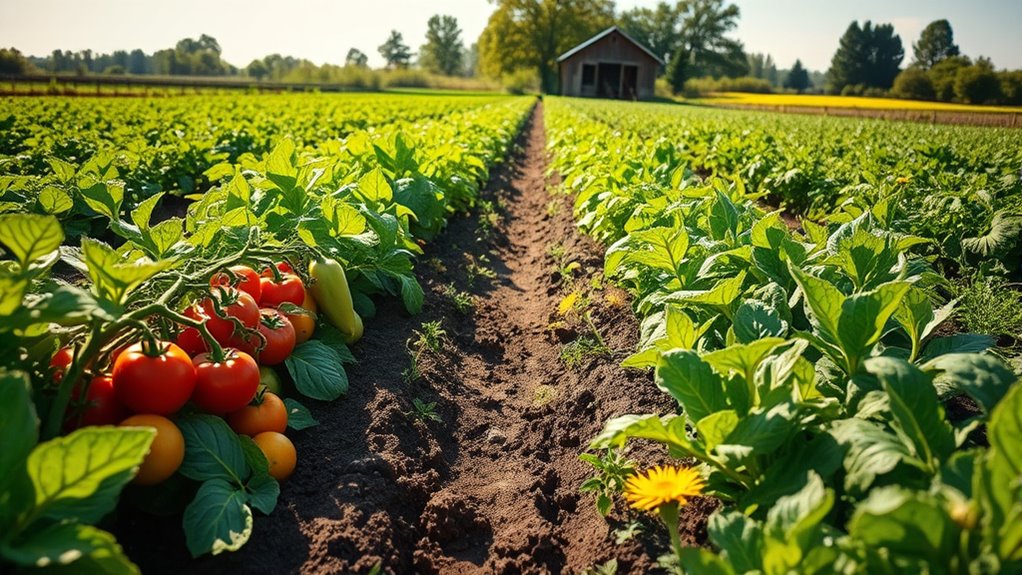
While many farming practices can harm the environment, organic farming stands out for its numerous ecological benefits. By limiting synthetic fertilizers, you help reduce greenhouse gas emissions and promote healthier soil through practices like crop rotation and composting. This approach enhances soil fertility and structure while supporting biodiversity by avoiding harmful pesticides and GMOs. Organic farming also minimizes chemical runoff, protecting our waterways from pollution. Furthermore, it encourages water conservation techniques that preserve vital resources and aligns with sustainable energy practices, promoting a holistic approach to environmental health. By sequestering carbon and improving soil health, you contribute to climate change mitigation. Additionally, implementing regenerative agricultural practices can further enhance the sustainability and resilience of organic farming systems. Ultimately, your commitment to organic methods fosters a balanced ecosystem, promoting resilience and sustainability in both agriculture and the environment.
Economic Growth and Market Trends in Organic Products
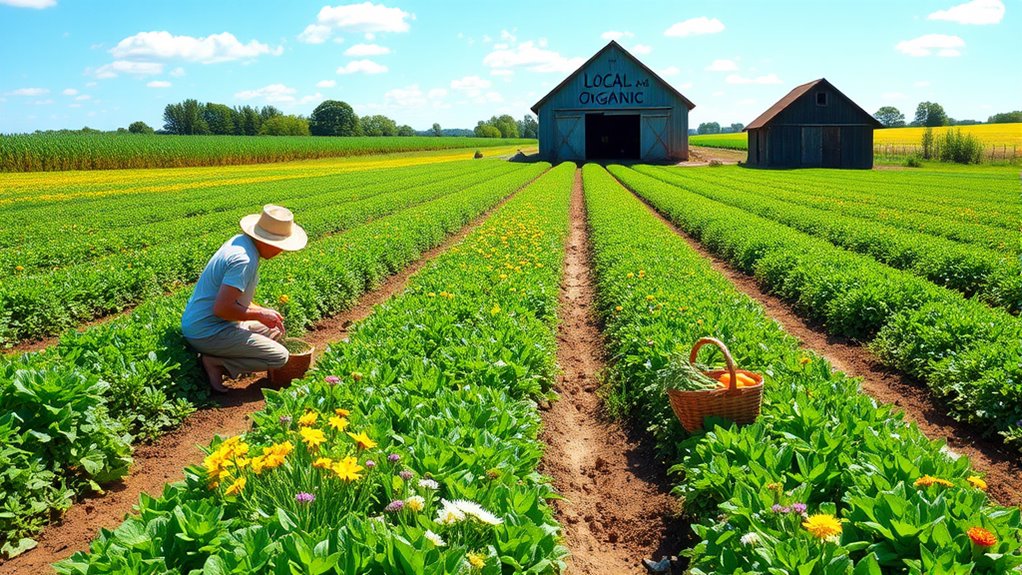
As consumer demand for healthier and more sustainable food options rises, the organic products market is experiencing significant economic growth.
The global organic food and beverages market, valued at USD 231.52 billion in 2023, is projected to grow at a CAGR of 13.9% through 2030. In the U.S. alone, organic food sales surpassed $67.6 billion in 2022.
North America and Europe dominate, but the Asia Pacific region is catching up, with countries like India and China leading the charge.
Fruits and vegetables account for 40.6% of global revenues, while organic meat, fish, and poultry are projected to grow the fastest.
With online sales booming, accessibility to organic products is becoming easier, catering to your eco-friendly shopping preferences.
Regulatory Standards for Organic Certification
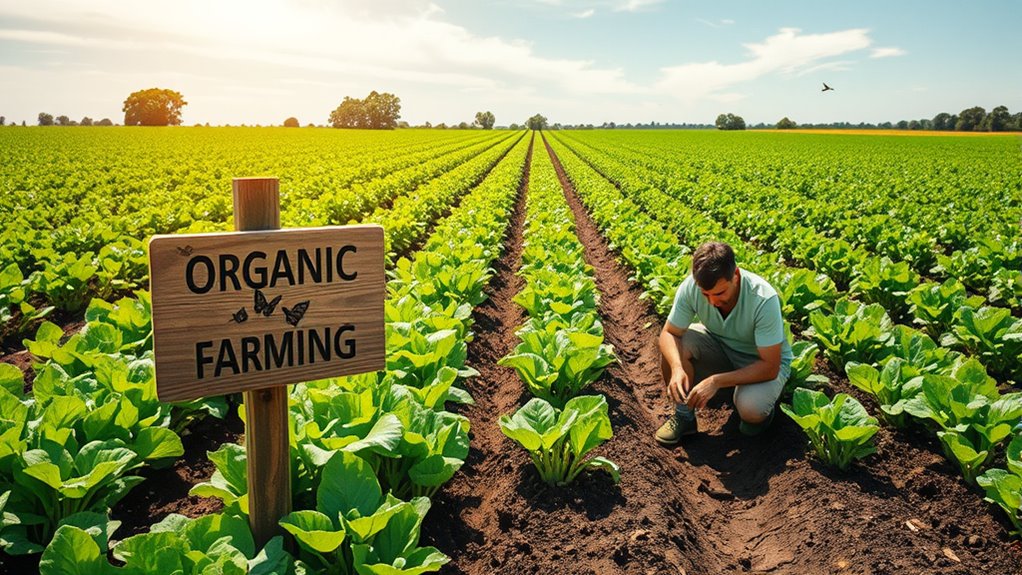
The rapid growth of the organic products market has led to a heightened focus on regulatory standards for organic certification.
You'll find that the National Organic Program (NOP) oversees these standards, requiring USDA certification for operations grossing over $5,000 annually. If you're below that threshold, you can't use the USDA Organic seal but still need to adhere to basic standards.
The certification process includes submitting an Organic Systems Plan and passing inspections, which happen annually. You must also keep detailed records and implement measures to prevent contamination.
The certification process requires an Organic Systems Plan, annual inspections, and meticulous record-keeping to ensure compliance.
Additionally, certain substances are prohibited, and there's a transition period of three years for converting fields to organic. Maintaining compliance is essential to keep your organic status.
Consumer Perceptions and Benefits of Organic Products
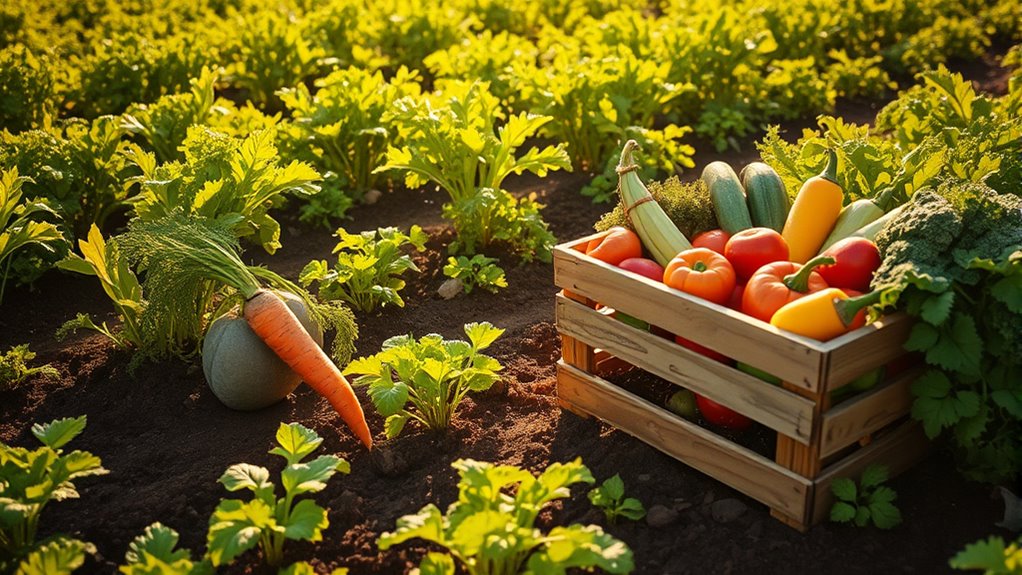
Consumer perceptions of organic products are shaped by a mix of health, environmental, and social factors. You likely see organic foods as healthier because they lack pesticides and GMOs, promoting a sense of well-being.
Environmentally, you might appreciate their role in reducing pollution and supporting biodiversity. Many consumers, especially younger, more educated individuals, view organic options as higher quality and more nutritious.
Social influences also play a role; if your peers prioritize organic, you may feel inclined to follow suit. Taste preferences often sway your choices too, as some find organic foods more flavorful.
Despite a higher price, the perceived benefits of supporting sustainable agriculture and healthier production practices can make organic products appealing to you.
Frequently Asked Questions
What Crops Are Best Suited for Organic Farming?
When choosing crops for organic farming, consider leafy greens like spinach and kale for their high yield and ease of growth.
Root vegetables such as carrots and beets thrive in various conditions.
Don't overlook berries like strawberries, which are in demand.
Additionally, legumes like beans are nutritious and simple to cultivate.
How Does Organic Farming Impact Animal Welfare?
Organic farming enhances animal welfare by creating environments that cater to animals' natural instincts.
You'll find animals roaming freely, enjoying spacious living conditions and organic feed, which keeps them healthy and happy. This system minimizes the use of antibiotics and hormones, promoting holistic well-being.
While challenges like mastitis and lameness exist, organic practices prioritize ethical treatment, aligning with the growing consumer demand for humane and sustainable farming methods that respect animal life.
Can Organic Farming Be Practiced in Urban Areas?
Yes, you can definitely practice organic farming in urban areas! By utilizing rooftops, balconies, and community gardens, you'll create vibrant green spaces.
Techniques like vertical farming and hydroponics maximize limited space. You'll avoid synthetic fertilizers and pesticides, ensuring healthier produce.
Plus, engaging with your community through workshops and shared gardens fosters connections.
Urban organic farming not only enhances food security but also contributes to a more sustainable and livable environment for everyone.
What Are the Common Challenges Faced in Organic Farming?
They say, "No pain, no gain."
In organic farming, you'll face numerous challenges. Weed management without synthetic herbicides is tough, and controlling pests can be labor-intensive. Maintaining soil fertility through methods like composting takes time and effort.
You might notice lower crop yields and struggle with higher production costs. Plus, navigating certification requirements and accessing markets can be daunting.
Embracing these challenges is essential for sustainable success in organic farming.
How Do Organic Farming Practices Affect Climate Change Adaptation?
Organic farming practices significantly enhance your ability to adapt to climate change.
By improving soil health, you increase moisture retention and reduce erosion, making your crops more resilient during extreme weather.
You also promote biodiversity, which naturally controls pests and diseases, minimizing the need for harmful chemicals.
Additionally, diversified cropping systems help spread risk, ensuring that even in challenging conditions, you can maintain productivity and sustainability on your farm.
Conclusion
In embracing organic farming, you're not just choosing a method; you're joining a movement back to our roots. It's incredible how supporting local farmers and sustainable practices can also lead to healthier communities and a cleaner planet. When you pick up that organic apple, you're not just making a choice for yourself but for future generations. The coincidence lies in this: by nurturing the earth, you're nurturing yourself. Together, we can make a difference that matters.

